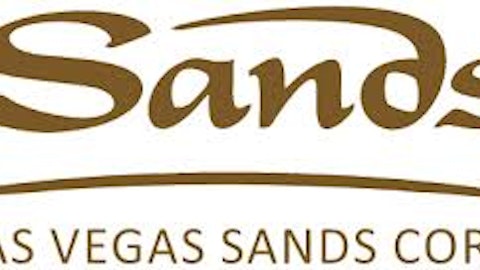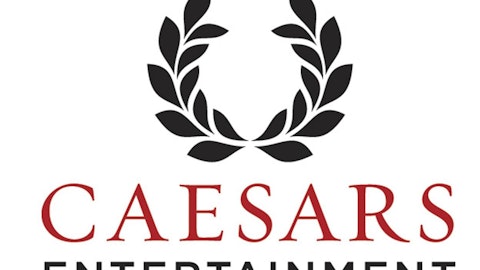The Great Recession was particularly tough on gaming stocks. Perhaps consumers strapped for cash found better ways to spend their money than gambling, and as a result casino stocks suffered. But as the economic recovery has taken hold, at least for the wealthy, things are starting to look up again for the industry. The largest casino stock by market cap, Las Vegas Sands Corp. (NYSE:LVS), looks like a good bet due to its solid growth fueled by its Macao operations and its reasonable valuation.
With a market cap of more than $50 billion and around 46,000 employees, Las Vegas Sands Corp. (NYSE:LVS) is the world’s largest casino operator by revenue. It operates casinos in Asia and the United States; its locations include names such as The Venetian, The Sands, and The Palazzo.

With a fairly high beta of 1.87, it’s not a gamble for the faint of heart. The stock is up over 40% in the last twelve months along with a strong industry performance. Furthermore, it yields 2.4%.
Asian Gamblers Fueling Growth
As mentioned in the introduction, casinos were hit hard in 2008 and 2009. However, The Sands somehow managed to turn a profit in these years, albeit a slim one. This in itself is quite an impressive achievement. Since 2010, annual earnings have rebounded in a big way, reaching $2.14 per share in 2012. Analysts are calling for earnings-per-share of $2.88 in fiscal 2013, and the three to five year expected growth rate is a massive 120%. That’s over four times the gambling industry average.
Yet most of the corporation’s growth is not being generated in Las Vegas, but rather in Asia. Macao in particular has been doing well, and The Sands exploited this area very successfully. For those who may not know, Macao is a former Portuguese colony located in China that grew to be Asia’s main gambling hub. In July, The Sands reported a 34% rise in annual Macao traffic with a record 5.6 million visitors.
The company’s Macao operations generated more than half of the group’s EBITDA in the most recent quarter. The monstrous growth the company is delivering there is causing a surge in the company’s bottom line. In the second quarter, the company’s adjusted Macao property EBITDA was up 53.2% to a record $657.2 million. In comparison, Las Vegas EBITDA was up ‘only’ 8%. Not content with the scope of its Macao operations, the company plans to open the $2.7 billion Parisian Macao by late 2015, for which construction work is already under way.
Competition Not Cashing in on Macao
If we accept for a moment the thesis that Asia will fuel the gambling industry’s growth going forward, we can see why The Sands easily outpaced its peers. Main competitor Caesars Entertainment Corp (NASDAQ:CZR) recently announced its plans to pull out of Macao. Reportedly, the US’s largest casino operator will use the proceeds of the sale of its Macao property to pay down debt, currently totaling more than $20 billion or around seven times its market cap. The company has posted six quarterly losses in a row, but has nevertheless seen its stock price appreciate a staggering 235% in the last year presumably in anticipation of a turnaround.
Wynn Resorts, Limited (NASDAQ:WYNN), another major competitor, does have a presence in Macao, but isn’t growing as quickly as The Sands. In fact, its Macao operations aren’t growing very well at all. Adjusted property EBITDA was down 4% year over year, with revenue down 2.6%. This was partly due to a renovation in the Wynn Resorts, Limited (NASDAQ:WYNN) Macao tower that reduced the number of available room-nights by about 5%. However, the company’s Las Vegas operations seemed to be performing better than those of The Sands with revenue up 16.2%.
MGM Resorts International (NYSE:MGM) is doing a little better in China. For the second quarter, MGM Resorts International (NYSE:MGM) China reported a revenue increase of 18% and record EBITDA of $205 million, a 10% sequential increase. Its Chinese operations are good for around half of the company’s consolidated revenue, and like The Sands, are growing faster than its domestic activities. Still, the company reported a loss overall, albeit slimmer than a year ago.
Valuations and the Bottom Line
The Sands currently trades at 27 times trailing earnings, which is around the midpoint of its average over the last five years. Wynn Resorts, Limited (NASDAQ:WYNN) trades at a similar multiple while Caesar’s trades in the negative. The Sands has a solid 25% return on equity, and its operating margin of around 23% is far above the industry average. Not unusual for casino operators, it has quite a bit of debt on the books at $9.49 billion, and around $2.51 billion in cash.
Las Vegas Sands Corp. (NYSE:LVS) seems to be one of the fastest growing casino operators at the moment. This is partly because the company has been doing a great of job of cashing in on its Macao operations. With high analyst expectations for 2013, and a new location planned in the area, one can assume that the company will be able to maintain this stellar performance. As the stock seems fairly valued at the moment, investors may want to wait for a pullback before getting in.
The article Cashing In on Macao’s Growth originally appeared on Fool.com and is written by Daniel James.
Daniel James has no position in any stocks mentioned. The Motley Fool has no position in any of the stocks mentioned.
Copyright © 1995 – 2013 The Motley Fool, LLC. All rights reserved. The Motley Fool has a disclosure policy.





